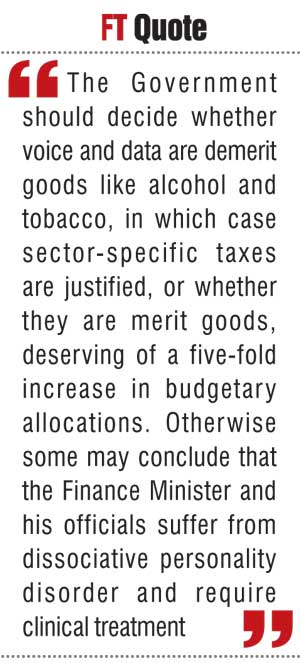Saturday Feb 21, 2026
Saturday Feb 21, 2026
Thursday, 3 November 2016 00:00 - - {{hitsCtrl.values.hits}}
A man checks his phone at the Colombo Railway Station. The tax burden on voice, SMS and value-added services has been increased by 80%, or almost doubled – Pic by Shehan Gunasekara
As of 1 November 2016, the Government has increased the tax that will be paid by a user of local mobile voice, SMS and value-added services by 80% from 27.55% to almost 50%. That means that for every Rs. 100 we spend on these services, we will have to pay the Government Rs. 50, compared to the Rs. 27.50 we used to pay.
Because Ministry of Finance officials took the trouble to explain how the taxes are charged on what we pay for mobile voice and data, I thought I had made a mistake and took a second look at what I had written when the VAT on top of the existing cess, tax and levy was first imposed back in May 2016. The first paragraph I wrote then is above. The only change is in the date from which we have to bear the new tax burden.
The officials cannot refute the fact that the tax burden on voice, SMS and value-added services has been increased by 80%, or almost doubled. Their only claim is that the tax burden is not 50% of what we pay, but 33% because the base is 150. We should all feel better as a result of this clarification.
For data, the previous combined tax was 12.24%, less than half what was levied on voice, SMS and VAS services. From 1 November, the Government has increased the tax burden on data by 160%, from 12.24% to 31.77%. None of the above numbers that I presented in May have been changed. But, as the Finance Ministry officials have kindly explained, the base is not 100, but 131.77. Therefore, we pay 24% of every rupee in every recharge to the Government as tax, when used for data. Since it is not 32%, but only 24%, we should be thankful.
This is because the Government failed to remove the industry-specific levies amounting to 27.55% for voice and 12.24 for data when decreeing that these services should be subject to VAT and NBT.
In May 2016, we could have made allowance for the hardworking Treasury officials being unaware of the fact that the telecom levy was imposed as a substitute for the previous VAT. But now we have to conclude that they have knowingly imposed VAT on top of sector-specific taxes, to increase the overall tax burden by 80% for voice and 160% for data.
This same Finance Ministry has, in the recently approved Appropriations Bill, increased the allocation for the Ministry of Telecommunication and Digital Infrastructure by up to Rs. 2.4 billion (Rs. 2,453,610,000) from Rs. 423.8 million in 2016. It would be reasonable to assume that this 479% increase over the base in 2016 is intended to realise the potential of ICTs.
Would it not be a much better use of the time of the Finance Ministry officials to explain the inherent contradiction of increasing the budget allocation for the ICT Ministry by almost fivefold, while simultaneously increasing the tax burden on voice by 80% and on data by 160% and thus discouraging ICT use?
As I stated back in May (see http://www.ft.lk/article/541127/Is-electronic-connectivity-a-demerit-good-like-alcohol-and-tobacco), the Government should decide whether voice and data are demerit goods like alcohol and tobacco, in which case sector-specific taxes are justified, or whether they are merit goods, deserving of a five-fold increase in budgetary allocations. Otherwise some may conclude that the Finance Minister and his officials suffer from dissociative personality disorder and require clinical treatment.
I myself think the explanation is simpler: they think they know how to spend our money better than we do. So they will take Rs. 50 and Rs. 32 for every Rs. 100 we spend on voice and data respectively and use it on boondoggle projects that they think are best for us.
For this, and for the clarifications on how to calculate the percentage tax burden, we should be thankful.